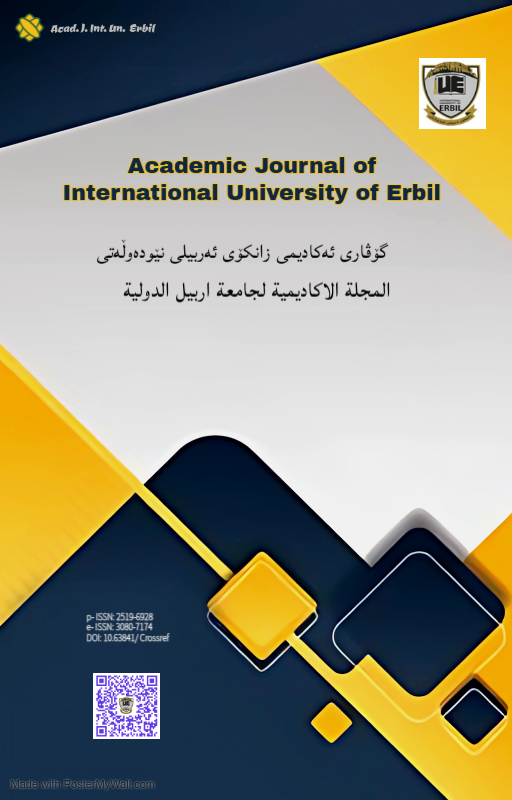The Role of Digital Transformation and Perceived Organizational Support in Enhancing Financial Reporting Quality in Kurdistan’s Small and Medium Enterprises (SMEs)
Digital Transformation and Perceived Organizational Support
DOI:
https://doi.org/10.63841/iue23547Keywords:
Cloud accounting, Digital transformation, ERP systems, financial reporting quality, Perceived organizational supportAbstract
Abstract This study explores the role of digital transformation (DT) and perceived organizational support (POS) in enhancing financial reporting quality (FRQ) in small and medium-sized enterprises (SMEs) in Kurdistan. Structural equation modelling was applied to primary data collected from 235 respondents including accountants, managers, owners, and other professional employees across three regions (Erbil, Sulaymaniyah and Dohuk). The analysis was conducted using Smart PLS 4 for structural equation modelling. The results show that DT has a notable and direct positive effect on FRQ, so confirming that using digital tools including ERP systems and cloud-based accounting software improves the accuracy, openness and timeliness of financial reports. Furthermore, the study shows that POS has a major impact on FRQ, meaning that workers who feel organizational support are more prone to participate in actions enhancing financial reporting. The mediation hypothesis was hence rejected since the mediation effect of POS between DT and FRQ was not supported. SMEs in Kurdistan should strike a mix between digital innovation and enough organizational support for sustainable development. Although bettering financial reporting depends on technological adoption, general organizational performance depends on employees feeling supported and valued.
Downloads
References
X. Teng, Z. Wu, and F. Yang, “Research on the relationship between digital transformation and performance of SMEs,” Sustainability, vol. 14, no. 10, p. 6012, 2022.
Z. Xin, Y. Xu, and L. Ma, “Research on successful factors and influencing mechanism of the digital transformation in SMEs”2022
R. Rupeika-Apoga, K. Petrovska, and L. Bule, “The effect of digital orientation and digital capability on digital transformation of SMEs during the COVID-19 pandemic,” Journal of Theoretical and Applied Electronic Commerce Research, vol. 17, no. 2, pp. 669–685, 2022.
S. Chen, L. Zhang, and Y. Lee, “The role of organizational support in the adoption of digital technologies: Evidence from small and medium-sized enterprises,” Journal of Business Research, vol. 138, pp. 213–225, 2022.
J. Adi, A. Rahmawati, and A. Surwanti, “Research trends on digital transformation on financial market development,” Multidisciplinary Reviews, vol. 7, no. 3, p. 2024062, 2023.
Y. Ma and S. Zhou, “Study on the impact of digital transformation on the financial performance of publishing enterprises,” in Proc. 4th Int. Conf. Economic Management and Big Data Applications, ICEMBDA 2023, Oct. 27–29, 2024.
P. M. Blau, Exchange and Power in Social Life Second edition. John Wiley & Sons, 2017.
F. D. Davis, “Perceived usefulness, perceived ease of use, and user acceptance of information technology,” MIS Quarterly, vol. 13, no. 3, pp. 319–340, 1989.
P. Dechow, W. Ge, and C. Schrand, “Understanding the role of management in financial reporting quality: Insights from the 2007-2008 financial crisis,” Accounting Horizons, vol. 24, no. 2, pp. 131–158, 2010.
M. E. Barth, M. Clement, and W. R. Landsman, “Capital markets research and accounting: A review of recent literature,” Journal of Accounting and Economics, vol. 31, no. 1–3, pp. 291–349, 2001.
K. Al-Mudhaki and M. Joshi, “The impact of information technology on financial reporting quality: Evidence from Saudi Arabia,” Journal of Information Systems, vol. 18, no. 1, pp. 75–92, 2004.
P. M. Healy and K. G. Palepu, “Information asymmetry, corporate disclosure, and the role of financial reporting,” Journal of Accounting and Economics, vol. 31, no. 1–3, pp. 405–440, 2001.
Y. Chen and Y. Zhang, “The impact of digital transformation on firm’s financial performance: Evidence from China,” Industrial Management & Data Systems, vol. 124, no. 5, pp. 2021–2041, 2024.
M. R. Khan, I. Khan, and M. A. Khan, “Impact of corporate social responsibility on financial performance: Evidence from Pakistan,” Journal of Business Research, vol. 140, pp. 569–582, 2022.
D. Latridis, “Digital transformation in accounting and finance: Challenges and opportunities,” International Journal of Accounting Information Systems, vol. 30, pp. 1–10, 2018.
T. H. Davenport, The AI Advantage: How to Put Artificial Intelligence to Work. MIT Press, 2018.
R. H. Mahmood and Z. H. Omar, “The role of intellectual capital in strategic sovereignty: An analytical study in soft drink companies in the city of Erbil,” Journal of the Iraqi University, vol. 63, no. 1, pp. 10–31, 2023.
P. C. Verhoef, P. K. Kannan, and J. J. Inman, “From multi-channel retailing to omnichannel retailing,” Journal of Retailing, vol. 97, no. 2, pp. 140–156, 2021
G. Vial, “Understanding digital transformation: A review and a research agenda,” The Journal of Strategic Information Systems, vol. 28, no. 2, pp. 118–144, 2019
M. Alshurideh, M. Al-Madi, and K. Al-Zubi, “The impact of information technology on the quality of financial reporting: Evidence from Jordanian industrial companies,” Journal of Accounting and Finance, vol. 24, no. 2, pp. 113–129, 2020.
D. S. Rogers, J. Hartwick, and P. R. Warshaw, “Using technology to improve environmental sustainability: A review,” Journal of Environmental Management, vol. 304, p. 114390, 2022.
C. H. Liao, Z. San, A. Tsang, and M. Yu, “Executive extraversion and voluntary disclosure: Evidence from management earnings forecasts,” Asia-Pacific Journal of Accounting & Economics, vol. 30, no. 1, pp. 56–71, 2023.
R. Sandor, H. de Coninck, M. den Elzen, M. K. Patel, R. Schaeffer, and D. P. van Vuuren, “Assessing the Paris Agreement: Progress and prospects,” Science, vol. 365, no. 6453, pp. 797–803, 2019.
A. E. Rafferty, N. L. Jimmieson, and A. A. Armenakis, “Change readiness: A multilevel review,” Journal of Management, vol. 39, no. 1, pp. 110–135, 2013.
M. S. Gillet, V. Mark, and J. M. Muskoff, “Employee training and perceived support in digital transformations,” Journal of Business Ethics, vol. 41, no. 13, pp. 2924–2940, 2022.
M. H. Ali and R. H. Mahmood, “The effect of organizational health on the knowledge sharing,” Qalaai Zanist Scientific Journal, vol. 7, no. 4, pp. 812–845, 2022.
P. Garg and R. Sharma, “Workplace spirituality and organisational effectiveness in the Indian higher education sector: Exploring the relationship and mediating role of positive organisational scholarship factors,” International Journal of Indian Culture and Business Management, vol. 32, no. 3, pp. 413–439, 2020.
R. Eisenberger, F. Stinglhamber, and L. Rhoades, “Perceived organizational support: A review of the literature,” Annual Review of Psychology, vol. 61, pp. 289–324, 2010.
S. Khan, “Transactional, transformational and laissez-faire leadership styles: A meta-analysis comparing women and men,” The Journal of High Technology Management Research, vol. 35, no. 2, 2024.
R. Eisenberger, F. Stinglhamber, and L. Rhoades, “Perceived organizational support: A review of the literature,” Annual Review of Psychology, vol. 61, pp. 289–324, 2010.
C. P. Maertz, J. Chen, and K. Ramachandran, “The impact of digital transformation on organizational performance: A systematic review and meta-analysis,” Journal of Management Information Systems, vol. 38, no. 3, pp. 719–754, 2021.
A. Ahmed, S. H. Bhatti, I. Gölgeci, and A. Arslan, “Digital platform capability and organizational agility of emerging market manufacturing SMEs: The mediating role of intellectual capital and the moderating role of environmental dynamism,” Technological Forecasting and Social Change, vol. 177, p. 121513, 2022.
L. Hu and P. M. Bentler, “Cutoff criteria for fit indices in covariance structure analysis: Conventional criteria versus new alternatives,” Structural Equation Modeling: A Multidisciplinary Journal, vol. 6, no. 1, pp. 1–55, 2000.
V. Venkatesh, M. G. Morris, G. B. Davis, and F. D. Davis, “User acceptance of information technology: Toward a unified view,” MIS Quarterly, vol. 27, no. 3, pp. 425–478, 2003.
Downloads
Published
Issue
Section
License
Copyright (c) 2025 Academic Journal of International University of Erbil

This work is licensed under a Creative Commons Attribution-NonCommercial-NoDerivatives 4.0 International License.












